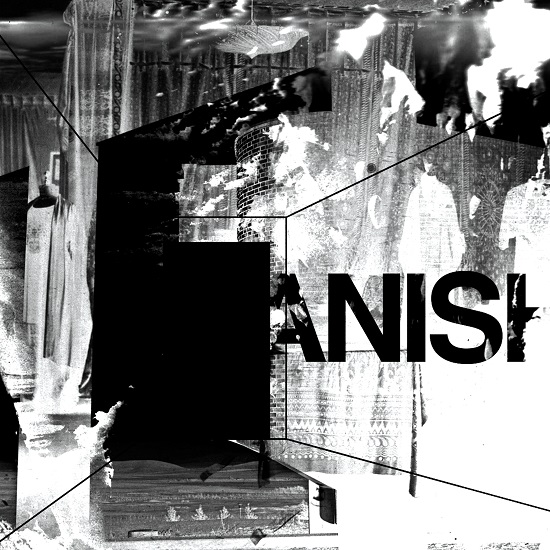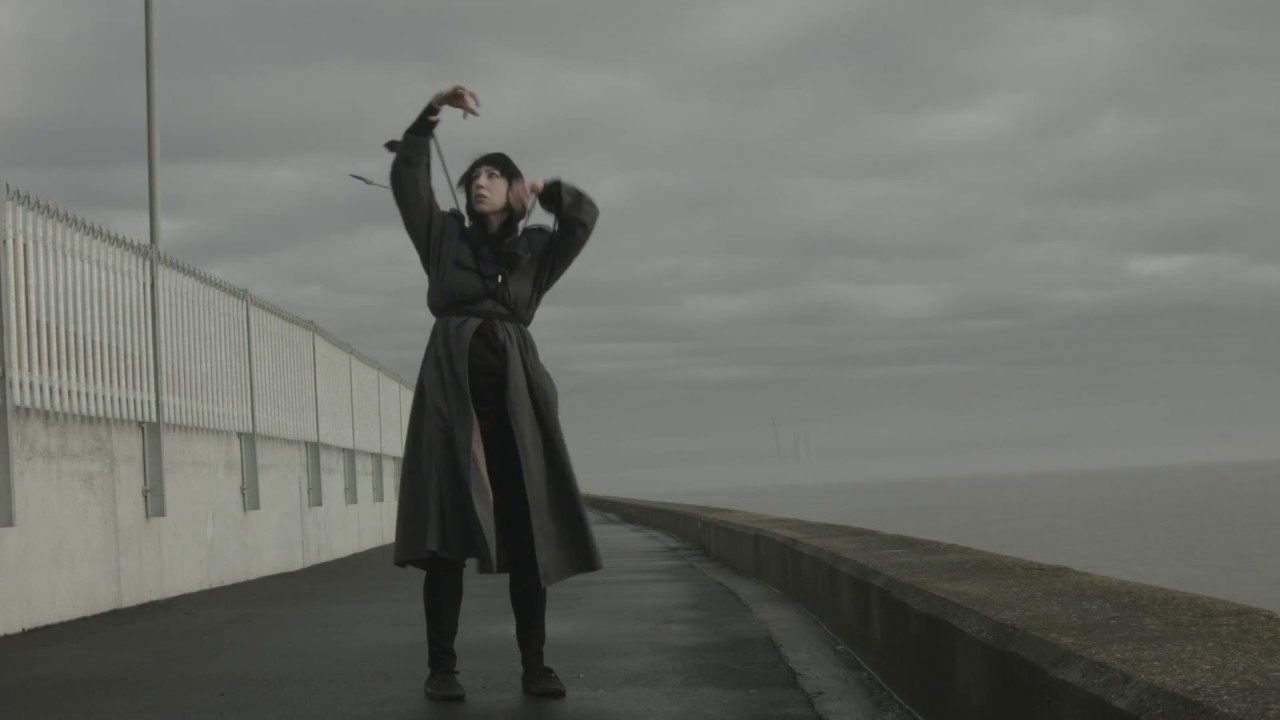On February 25, Manchester’s LoneLady takes over the rarely-used subterranean ‘Deadhouse’, beneath London’s Somerset House, for the second edition of her club night Shutters Down.
Headlining will be Vanishing, the terrifying avant-noise project of Hull-born, now Manchester-based, spoken word artist Gareth Smith. Along with Gnod’s Paddy Shine, who provides the spine of the fierce, sprawling instrumentals that back Smith’s forebodingly delivered lyrics, and an array of guest collaborators, their self-titled debut album is due on March 27.
An outlet for the crushing sense of anxiety, claustrophobia and incoming doom the world’s political climate currently inspires, Smith’s strikingly singular vision is matched on all fronts when it comes to the project. The video for track ‘Brighton 84’, premiering above, for example, sees vicious, constricted interpretative dance from Gwen Osmond against an eerie backdrop of Hull’s old docklands by the river Humber.
Shutters Down will be the group’s first foray into live performance, an experience the group hope to execute in direct response to their surroundings at any given time. On February 25 they’re treated to the most auspicious of environments, with The Deadhouse, normally used to store 17th Century gravestones, to be transformed by LoneLady into an installation inspired by the urban wilderness titled ‘Transmissions From A Wilderness State’. You can find out more about the night at large here.
They’re also playing a show as part of Hull’s City of Culture celebrations on March 7, framed around the Coum Transmissions retrospective. Find out about that particular event here.
Below, Smith tells us more about the story of this rather special project, and what exactly we can expect at Shutters Down.
What’s the story of the Vanishing project?
Gareth Smith, Vanishing: I was involved in a few other projects where I leading the music side of things, and I wanted another outlet for more spoken word stuff. It’s a collaborative thing, but at the start it was very much that the music was written by other people and I just kind of did my own thing. We did a tape a couple of years ago and since then we’ve made the new record. This is our debut gig coming up, so it’s very much in its infancy. There are different collaborative elements, I drive the project but there’s different kinds of input from other individuals. A lot of the band Gnod are on the record and Paddy kind of sits alongside me in the project. Julie from LoneLady is on it too. In total there’s probably six people on the record, though me and Paddy are the core of the music.
What’s the process in terms of bringing these collaborators together into a singular project?
GS: Paddy I have known for a long while, he’s a close friend. I was asking for material to build the new record and he fished out a bunch of atmospheres. That was the core idea, not to write songs, or write tracks or anything, it was just to build some atmospheres. He’s quite a prolific writer himself, so he’s always got material floating around. I went through a bunch of his stuff and found little snippets I liked to build music around. Sometimes it would be a beat or a little sound, and I’d use that as a prompt for me to start writing my bit. Then I can take it back to Paddy at some point and he’d maybe add a little touch to it. Then we rerecord it, and finish it all in a proper studio.
You had a tape out a couple of years ago, how did that sound in comparison to the new album?
GS: It was primitive, it was just basically one or two lines of music that was done by Paddy with me doing my vocal on the top. This new record has a lot of layers to it, a couple of tracks are still quite primitive, but there’s a few that build up into something much more epic. This is I perceive to be a piece of work; the previous thing was a bit of a test really.
Is there an overarching concept or narrative?
GS: There’s not really a concept to it, but I think there’s a coherency to how it comes out. I think lyrically and sonically it’s very much a record about alienation and claustrophobia. My own personal alienation and claustrophobia and how that plays out into a wider narrative of what’s going on on the day-to-day.
Where does that sense of claustrophobia stem from?
GS: I think it’s increasing immensely due to the climate, this terrible feeling of dread about how to contribute meaningfully and bring about positive change but also how to reflect my own desires to be selfish as a creative person. I’m not alone in going through these crises, when we think about how we can comment and act upon the madness of the current time. So that’s my personal anxieties that are running through it and then the politics from that side of it filters into the record as well.
Subconsciously, has Vanishing become an outlet?
GS: When Paddy and I started putting the record together I found myself drawn towards the darker, the heavier, oppressive sounds. Then the lyrics stemmed from the initial process of listening to those little sounds, sometimes for six or seven hours, I’d listen to one little beat and try to get into the heart of what it was, what drew me towards this and how I feel emotionally about it and how that fits in within wider society. That’d be the process, then I’d start to shout some words, and after that I’d start to assemble materials, buffers, around the words, to give the piece of music its fullest kind of reading.
Are you satisfied with the result?
GS: Once the first few tracks were recorded I was so happy with the depth of content and the depth of my own personal emotion that was invested in it, and the political references and the anchor points in them. It felt in that moment, after listening back to the tracks, that I had the potential to create something that was really special, rather just bashing stuff out. I felt I set quite a high mark early on, with the first couple of tracks, which gave me the enthusiasm and the desire to keep pursuing it at that level.
Tell me more about the writing process, when it comes to your lyrics?
GS: For this album, 80% of the time I would listen to Paddy’s stems and find the ones I like. So on ‘Brighton 84’, for example, that heartbeat, that pound that is going through it, I would listen to that and try to get absolutely immersed in what that sound is, and how that’s making me feel. So I would literally probably listen to it for about six to seven hours for a couple of days a week, and just keep writing, endlessly writing, about how this is making me feel and all the tangents that are running off that, and then try to pick through it and see what that is, what that narrative is.
With Somerset House being your first gig, how do you intend to translate that intensity to a live stage?
GS: Good question… We’ve been rehearsing for about two months, me and Paddy, and another guy Karl D’Silva, who plays in a band called Drunk in Hell. We’re trying it loose and improvised, but within the framework of what we’ve actually already got. Paddy is using an interesting set up, I really like it. He’s using two CDJs and he’s basically live mixing the stems with the drum machine. Karl is a great saxophone player, he’s bringing melodic content, through synth and saxophone, and I’m going to be loosely reinterpreting, improvising around the words really. It will very much be recognisable from the album but done in an elongated kind of improvised way, that– hopefully – is a bit more reactive and responsive to the environment we’re thrust into really. The sound might be really strange in a dead house, so the theory is by using this kind of technique means we don’t feel anxious about if it sounds weird or strange, we’re just able to listen to it. I want the performance element just to be the music, as dimly lit as it can be.
How did you come to be involved in the Shutters Down night?
GS: Well Julie [LoneLady] is my partner actually, though it’s not just nepotism! She’s very much aware of what we’ve been doing, and with Shutters Down I think she was quite keen to have a noisey start to the whole process. It’s going to be quite an aggressive environment, so she was looking for somebody that could bring some noise and some aggression into that environment. It kind of fitted us, and it’s a really great opportunity for us.
Beyond Shutters Down and the Hull show, how far do you see this project, and this particular concept going?
GS: This is a piece of work that I’m tremendously proud of. I’m seeing good responses from the people that I’m slowly leaking it to, so I’m keen to push it as far as I possibly can, doing as many shows as I can. But I am trying to keep it controlled in a way, and trying to present in a way that is fitting to the record. I’m not interested in just slogging it on the gig circuit, I’m really keen to do lots of shows, but I’m really keen to do some interesting shows that push that sort of stuff forward. It’d be great to get some funding; I’m looking at a lot of different funding opportunities to create some live shows that are in a different context. Maybe with Gwen, maybe re-enacting some of her stuff from the video, elements of that.



